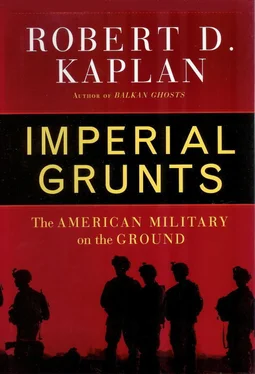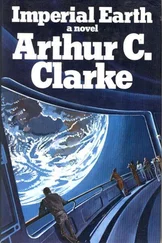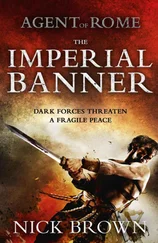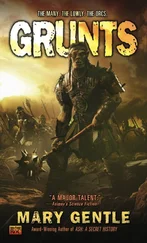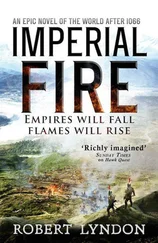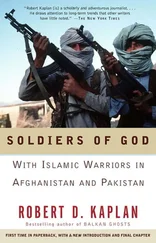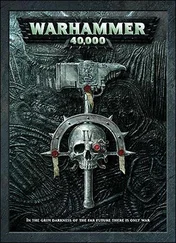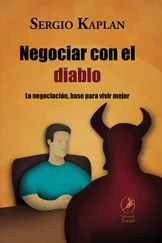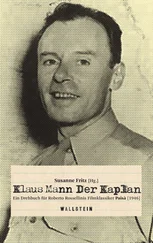It was sometimes hard to imagine someone as serious and intense as Capt. Jason Smith. And yet there was a courtly quality about him, too. I thought of a Confederate officer.
Through his Iraqi translator, Smith told the man: “Sir, we are truly sorry that we had to ask your family to leave the building. You can all go back in now. We will compensate you for the inconvenience. We are United States Marines, a different breed than you are used to. We do not take kindly to people shooting at us. If you have any information about the Ali Babas, please share it with us. If you know any of the Ali Babas personally, please tell them to attack us as quickly as possible, so that we may kill them and start repairing sewers, electricity, and other services in your city.”
After the translation was completed, the man, looking dumbfounded, gripped Capt. Smith’s hand and wouldn’t let go. Smith wasn’t kidding about the compensation. Lt. Col. Byrne had been given a hoard of ready cash to use as he saw fit in order to win allies in the city. Byrne already had plans to pay the owner of the soda factory. “I’m going to give him rent, make repairs, buy a lot of his soda, and pay his employees for all the days they missed work because of us.”
Walking back to the garage across an open space, we were set upon by an RPG and an intense barrage of small arms fire. We ran for cover and crouched against a building. Then we saw a body in the street. Amid the chaos, a marine had accidentally killed an Iraqi civilian who was suspiciously running away. Smith got angry at the marine. “Did he have a weapon? No! So where in the ROEs does it say you can shoot at him?” Everyone became somber. I felt bad for the marine who had fired the shot—any civilian would have felt bad for him, if he or she had experienced the complexity and confusion of this urban battle space, and the split-second life-or-death decisions required. Another luxury car passed, tracking our movement. “It’s like trying to grab a fistful of water,” Smith remarked, looking at the car.
Back at the garage, I finally got to strip off my excess layers of clothing. I had sweated so much that the glue holding together the laminated press credentials around my neck had melted and destroyed them. I ate my Country Captain Chicken, now cold. I didn’t care. The moment that the danger had passed, I realized I was starving.
Smith took out a packet of instant coffee powder and poured it dry on his tongue, chasing it down with mineral water. Then he conducted a debrief.
Again, slightly hunched, with hands in pockets, he spoke in his slight southern drawl: “I find it encouraging that while our units were separated, we quickly got organized and moved on the objective. But the moment the objective was cleared, we let our guard down. We took too long crossing the open space, got fired upon, and shot a civilian. I know we have been running on empty without sleep and little food or water. But I expect more of marines. We are going to spend the night doing foot patrols. We are going to stop suspicious vehicles. The Ali Babas don’t take chances. They left the mosque as soon as we closed in on it. They look for targets of opportunity. We won’t give them any.”
I noticed 2nd Lt. Palmer, the young marine with the serene look in his eyes who had been with me the night before in the truck, talking about books. He had slipped into the garage with a few of his men. Despite the turmoil and absence of sleep, he was upbeat while talking to me. I heard another marine say, “We’re in shape to handle this without much sleep. Thank God Capt. Smith PT-ed the shit out of us at Camp Pendleton,” referring to physical training.
Indeed, Cpl. Nicholas Magdalin of Chicago, who had been attached to Bravo and was now with the Renegades, told me that back at Camp Pendleton, when the company “wasn’t working well together, Capt. Smith took us on a field op. He fucking broke us. I mean broke us. We were so desperate,” Cpl. Magdalin went on, “that in order to survive the hike we started helping each other as never before, the stronger guys carrying the packs of the weaker guys. It made us really come together as a team. Seeing that, Capt. Smith finally allowed us to rest, telling us that ‘there wasn’t anything we couldn’t do, no matter the odds, if we had unity.’”
After I had finished my MRE we were attacked again by RPGs, mortar, and small arms. Again, everyone moved in the direction of the fire. This time it was two blocks away to the north, on Michigan. The crack of bullets can be a good sound. It often means outgoing, and in any case usually means it is a safe distance away. The whistle and swish of bullets is bad; it usually means incoming and close by. Running down a back street with one of Capt. Smith’s lieutenants, we heard the latter sound. Both of us jumped into a sewer ditch.
This firefight, like the previous one, lasted more than an hour, though they both seemed much longer. On a few occasions, I caught glimpses of the insurgents—in black pajamas and fedayeen-style keffiyahs—who were shooting at us. The combat was that close.
There was no sweeter sound than the drone of the AC-130 overhead. It meant help was on the way. Then came the thudding, drilling noise of its guns—help itself. I thought of the two forward air controllers, Capts. Chris Graham of Miami and Don Mareska of Moscow, Idaho, two backslapping friendly pilots who, only a few weeks before, had been downcast with me in the chow hall over the fact that in this SASO environment, they wouldn’t have the opportunity to use their skills. Now they were the stars of the show. Mareska would be slightly wounded in the leg the next day.
The AC-130 was one of the few advantages the marines had. Almost all of the fire and explosions I heard were incoming. The insurgents could fire indiscriminately and blame collateral damage on the Americans, whereas the Americans I saw picked and chose their shots carefully. There was zero toleration for civilian casualties, though it was an impossible standard to always meet.
I wasn’t back at the garage for more than half an hour before the third sustained, intense firefight of the day commenced. Two marines were wounded. I rode in a Humvee truck with them back to the soda factory. The truck got stuck for a moment crossing Michigan, which had become a free-fire zone. A hail of bullets descended on us. Luckily the side panels were up-armored. I lay flat against my stomach.
Through all the attacks that day, April 6, 2004, Bravo Company had gradually advanced its lines deeper into the city. There was nothing fancy about this: the marines slugged it out three steps forward, two steps backward. This was the classic, immemorial labor of infantry, little different from the way it had been practiced in Vietnam, World War II, and earlier back to the Greeks and Romans. Commanders inserted grunts and waited for them to be attacked, using the opportunity to break the enemy over the contact line. Whereas elite assets like Delta were high maintenance and required specific high-value targets, there was still a place in this world for old-fashioned infantrymen.
Back at the soda factory, the new FOB headquarters, I learned that there were still no units available to relieve Bravo. Capt. Smith’s marines would have to fight on, with little sleep. I again thought of the throngs of troops at Camp Victory.
———
The Renegades had their Humvees outside the walls of the forward operating base, guarding it against attack. As there was no running water for a shower, soon after I returned I went back outside the perimeter to visit with Bednarcik, Pena, and Neal. “Sit with us for a while and relax. You need it,” one of them said. That’s when the 122mm rocket landed fifty feet away.
As with gunfire, the thud of an explosion can be a good sound; it means that you missed it. But the swoosh and airflow of an incoming rocket means oh shit, it’s over, as you cower in the longest split second you’ll ever know. That’s the sound we heard. The Humvee rocked; fortunately it was up-armored. Lance Cpl. Neal, a bundle of delightful energy who had not stopped talking for weeks, went silent for a while, whereas Lance Cpl. Nathan Favorit of Watertown, Minnesota, the machine gunner in the next Humvee, who was usually so quiet that not even Lt. Col. Byrne could draw him into a conversation, suddenly exploded in chatter. “I tried to get Neal on the ICOM. ‘Talking Guns [Neal’s call sign], this is Bastard Guns, please, please come in.’ For a moment there was no response. My God, I thought you guys…”
Читать дальше
